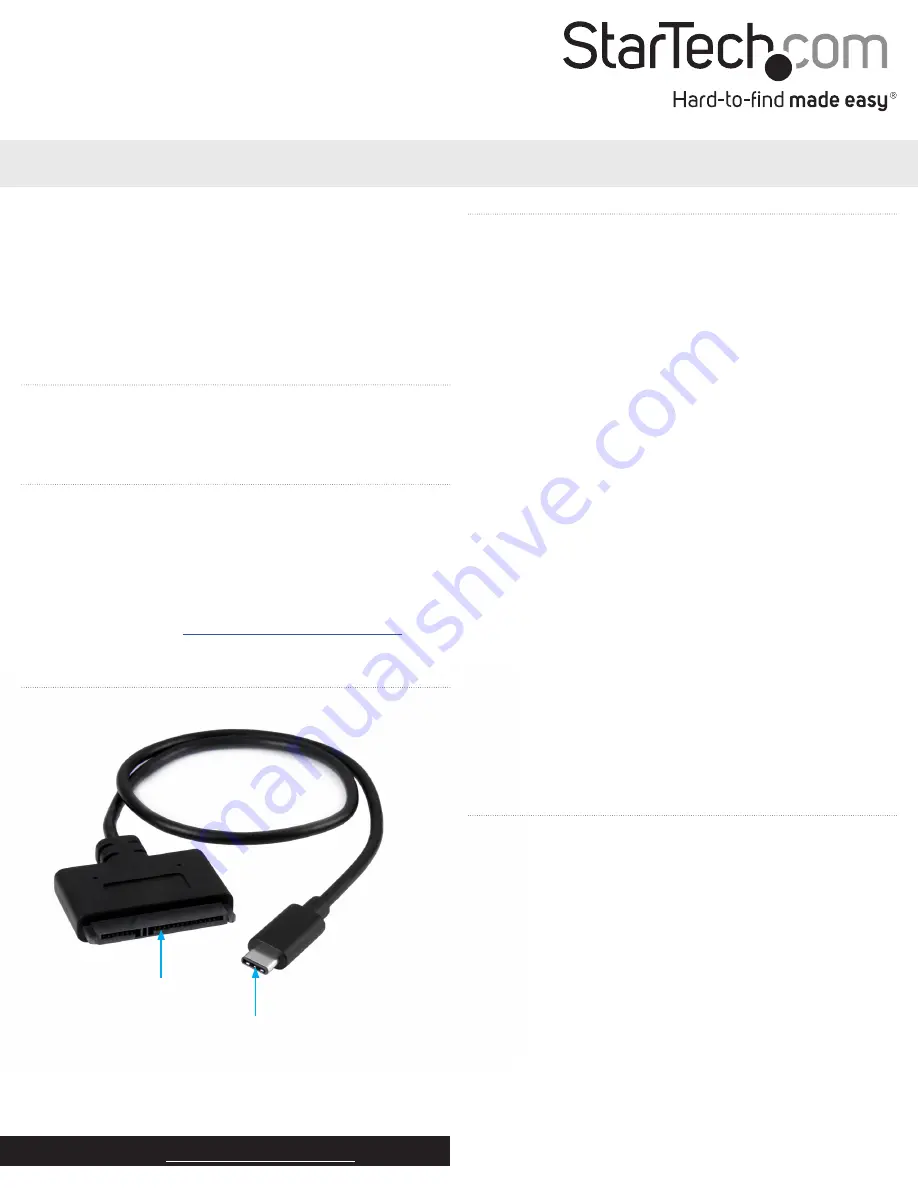
Instruction manual
DE:
Bedienungsanleitung - de.startech.com
FR:
Guide de l'utilisateur - fr.startech.com
ES:
Guía del usuario - es.startech.com
IT:
Guida per l'uso - it.startech.com
NL:
Gebruiksaanwijzing - nl.startech.com
PT:
Guia do usuário - pt.startech.com
Manual Revision: 08/12/2015
For the latest information, technical specifications, and support for
this product, please visit www.startech.com/USB31CSAT3CB.
Packaging contents
• 1 x USB 3.1 to SATA 2.5 in. HDD adapter cable with USB-C™ port
• 1 x instruction manual
System requirements
• USB-enabled computer system with an available USB Type-C™ port
• 2.5 in. SATA drive
Note:
To obtain the maximum USB throughout, you must use a
computer with a USB 3.1 Gen 2 port.
System requirements are subject to change. For the latest
requirements, please visit
.
USB31CSAT3CB
USB 3.1 Gen 2 (10 Gbps) Adapter Cable for SATA Drives - with USB-C
*actual product may vary from photos
Product overview
USB-C connector
SATA connector for
2.5 in. HDD or SSD
Connect the adapter
Warning!
Hard drives and storage enclosures should be handled
carefully, especially when they’re transported. If you’re not careful
with your drives, you may lose data as a result. Always handle
storage devices with caution. Make sure that you’re properly
grounded by wearing an anti-static strap when you install any
computer component. If an anti-static strap isn’t available, touch a
large grounded metal surface for several seconds to discharge any
built-up static electricity.
Note:
The USB31CSAT3CB adapter cable only works with 2.5 in.
HDD (hard drives) and SSD (solid state drives), because 3.5 in. HDDs
and optical drives require 12V of power and the adapter cable only
provides 5V of power.
1. Connect the SATA connector on the adapter cable to the SATA
receptacle on your 2.5 in. HDD or SDD.
2. Connect the USB-C connector on the adapter cable to a USB port
on the host computer system.
After the adapter is connected to a computer, the necessary software
automatically installs and the drive is accessible as though it were
installed internally in the system.
Before you use the drive, you must format it according to your
operating system requirements. To format your newly attached drive
or to create partitions, consult the documentation that came with
your operating system at the time of purchase.
About powering the drive
The drive adapter doesn’t require an external power supply, as it
receives enough power from the USB bus that it’s connected to.
Initialize the drive
If your computer doesn’t automatically recognize the drive, you need
to initialize and format it to the operating system.
If you use a computer that’s running Windows® 2000, Windows® XP,
Windows Vista®, or Windows® 7, do the following:
1. Depending on the version of the OS that you’re running, do one
of the following:
• On your desktop, right-click
My Computer
.
• On your desktop, right-click
Computer
.
2. Click
Manage
.
3. On the
Computer Management
screen, click
Disk Management
.
4. A dialog window appears and asks you to initialize the hard drive.
Depending on the version of Windows that you’re running, you
have the option to create either an
MBR
or a
GPT
disk.
Note:
GPT (GUID partition) is required for hard drives that are larger
than 2 TB, but GPT isn’t compatible with some earlier versions of
operating systems. Both earlier and later versions of operating
systems support MBR.


